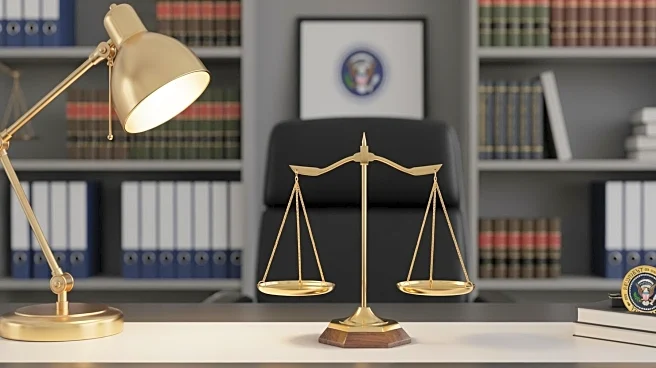What's Happening?
Paul, Weiss, Rifkind, Wharton & Garrison L.L.P., a leading global law firm, has been targeted by an executive order from President Trump. The order directs federal agencies to review security clearances
of Paul, Weiss attorneys, restrict their access to federal buildings, and potentially terminate government contracts with the firm. This action follows Trump's dissatisfaction with the firm's involvement in cases against him and its D.E.I. employment practices. The firm, known for its civil rights work, faces significant operational challenges as its ability to represent clients before federal courts and agencies could be severely impacted.
Why It's Important?
The executive order against Paul, Weiss represents a significant use of executive power that could have far-reaching implications for the legal industry. By targeting law firms based on their representation choices, the administration challenges the fundamental rights of legal practice and the First Amendment. This move could set a precedent for governmental interference in legal representation, affecting the independence of legal advocacy and potentially leading to a chilling effect on lawyers who might fear repercussions for representing certain clients. The broader impact could undermine the rule of law and the separation of powers, essential components of democratic governance.
What's Next?
Following the executive order, Paul, Weiss settled with the administration, agreeing to provide $40 million in pro-bono services to support government initiatives and to refrain from adopting D.E.I. policies. Other law firms have followed suit, collectively agreeing to nearly a billion dollars in pro-bono services. The settlement raises questions about the future independence of legal firms and their ability to resist governmental pressure. The legal community may need to address these challenges to maintain the integrity of legal practice and uphold constitutional rights.
Beyond the Headlines
The situation highlights ethical concerns regarding the weaponization of executive power against legal entities. It underscores the importance of safeguarding the independence of the legal profession and the potential consequences of compromising on principles for operational survival. The long-term implications could affect the legal industry's role in defending civil liberties and maintaining checks and balances within the government.











